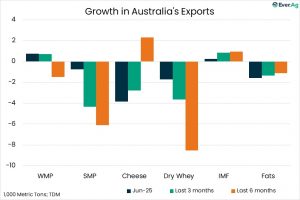
As cheese lovers keep hearing warnings about eating too much saturated fat, here comes another study that goes against the conventional wisdom about heart health and dairy fat.
Researchers analyzed blood samples of more than 4,000 adults in Sweden — where dairy consumption is among the highest in the world — and followed them for 16 years to see how many had heart attacks, strokes and other cardiac events.
After adjusting for age, lifestyle, dietary habits and other risk factors, the people with higher levels of dairy fat intake biomarkers had a lower risk of cardiovascular disease compared to those who ate less dairy fat.
The authors then looked at the findings from 17 comparable studies involving almost 43,000 people in the U.S., U.K. and Denmark, and found the combined evidence showed similar results. The analysis was published last month in PLOS Medicine.
There’s growing evidence the type of dairy consumed — whether cheese, yogurt, milk or butter — may be more important than its fat content when it comes to health, said lead author Kathy Trieu.
For example, cheese intake didn’t increase LDL, or “bad” cholesterol in previous research, while consumption of butter was associated with higher total mortality in a recent analysis.
“Our study suggests that cutting down on dairy fat or avoiding dairy altogether might not be the best choice for heart health,” Trieu, a research fellow in food policy at the George Institute for Global Health in Newtown, Australia, noted in a statement.
“It is important to remember that although dairy foods can be rich in saturated fat, they are also rich in many other nutrients and can be a part of a healthy diet. However, other fats like those found in seafood, nuts and non-tropical vegetable oils can have greater health benefits than dairy fats.”
The biomarkers used in the study — blood levels of certain fatty acids found in dairy foods — can’t distinguish between the types of dairy a person eats. But they’re a more objective measure compared to asking people to recall how much cheese or butter they ate that day, the authors wrote.
Last year, the average American consumed 655 pounds of dairy in milk, cheese, yogurt, ice cream and butter, according to the International Dairy Foods Association.
Health guidance from the U.S. government and organizations like the American Heart Association urges limiting saturated fats in the diet — including cutting down on regular-fat cheeses, whole or 2% milk, butter, cream and cream cheese — to keep cholesterol in check.
A healthy dietary pattern includes dairy in the form of fat-free or low-fat milk, yogurt and cheese, according to Dietary Guidelines for Americans, 2020-2025.
But the new study is just the latest in recent years to raise doubts about the current advice. Most dairy products, especially cheese and yogurt, were found to protect against premature death from any cause, though whole milk still appeared to increase the risk of heart disease, according to research presented in 2018.
A study published in 2017 suggested there’s no link between intake of full-fat milk or other dairy products and heart disease risk or all-cause death. Then, there’s the “French paradox”: The French famously eat a high-fat diet, yet have lower than expected rates of heart disease.
The bottom line then and now remains the same: Limiting total saturated fat in your diet is linked to a reduced risk of cardiovascular illness, said NBC News Health and Nutrition Editor Madelyn Fernstrom.
The vast majority of scientific studies show the link clearly in many different ways, so while the latest study is one small piece of the puzzle, almost all the other puzzle pieces support keeping a close watch on saturated fat intake for the sake of heart health, she advised.
“To translate the science to everyday healthy eating, the goal is to limit, not eliminate all saturated fat from the diet,” Fernstrom noted.
“Think about bartering — if you have a roast beef sandwich, skip the cheese. Use whole milk instead of cream in coffee. Use 2% milk for cereal instead of whole milk.”
And while there’s been debate about whether fermented dairy products, such as cheese and yogurt, may be more protective than milk and butter, Fernstrom wasn’t impressed by the concept, noting the amount of saturated fat would be equivalent in full-fat milk and yogurt.
“The health benefits still don’t outweigh the risks. So if you prefer yogurt, choose that. If you don’t really enjoy yogurt, but figure a better choice, it’s not,” she said.
More studies are needed to understand if and how dairy foods protect cardiovascular health, the authors of the new study emphasized. So when it comes to cheese, the healthiest way to eat it may be to watch portion sizes and be thoughtful about the rest of your diet, said Samantha Cassetty, a registered dietitian in New York.

























